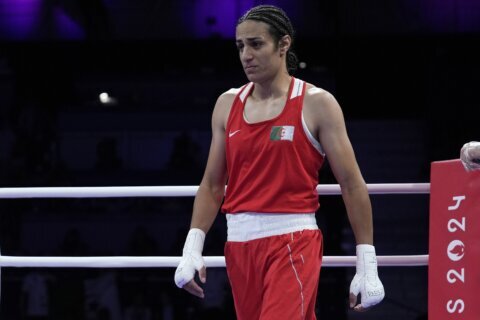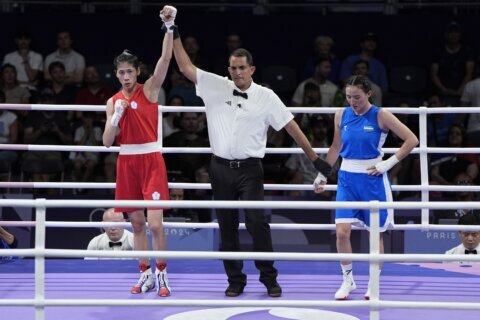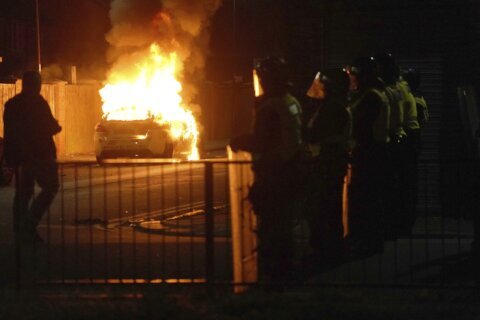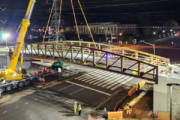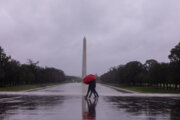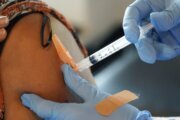ABUJA, Nigeria (AP) — Nigerian security forces on Saturday fired bullet rounds and teargas at several journalists and protesters during demonstrations against the country’s economic crisis in the capital city, Abuja, according to journalists at the scene and videos reviewed by The Associated Press.
It was not immediately confirmed whether the projectiles fired at journalists were rubber or live rounds. But the AP witnessed the aftermath of the attack, including bullet holes in a car belonging to one of the journalists as well as live bullets at the scene of the protests.
At least 50 journalists were arrested on Saturday during the protests in Abuja, Amnesty International Nigeria’s office said. Nearly 700 protesters have so far been arrested across the country while nine officers have been injured during the protests, now in their third day, the Nigerian police said.
The ongoing demonstrations are mainly against Nigeria’s worst cost-of-living crisis in a generation and accusations of misgovernment and corruption in Africa’s most populous country. Nigeria’s public officials are among the best-paid in Africa, a stark contrast in a country that has some of the world’s poorest and hungriest people despite being one of the continent’s top oil producers.
At the Nigerian national stadium where dozens of protesters had gathered, police officers were seen firing tear gas to disperse the demonstrations shortly before hooded operatives believed to be from the Nigerian secret service arrived, according to several protesters, journalists and videos shared with The AP.
The Nigerian secret service, or Department of State Service whose operatives are usually hooded, quickly dispersed the protesters and then fired gunshots at the journalists who were still at the venue, according to six journalists there who spoke to The AP on the record.
A video shot by one of the journalists showed the gun-wielding operatives chasing people in front of the stadium. Their vehicles, at least five in number, were parked alongside those of the Nigerian police.
“It was shocking because they saw us as journalists and we were telling them we were journalists,” said Abdulkareem Mojeed, one of the journalists attacked. At least three bullet holes pierced his car.
The journalists said they were far away from the protesters. They were wearing vests identifying them as media and were next to vehicles with media branding when they were fired at, they said.
A spokesperson for the secret service did not respond to telephone and email inquiries from The Associated Press. The service, which has a reputation for brutality, has frequently been accused of violent attacks and wrongful arrests.
Journalist Abdulqudus Ogundapo said he was scared for his safety when caught in the gunfire. “My first reaction was, ’let me just be safe,” Ogundapo said, before they drove away.
It is common for journalists to be targeted by security forces while in the line of duty in Nigeria, which is ranked 112th out of 180 countries in the latest World Press Freedom Index by Reporters Without Borders.
Protesters, too, have been shot at in the country, including during the deadly 2020 demonstrations against police brutality.
At least 31 cases of attacks against journalists, including 11 arrests, have so far been recorded since the cost-of-living protests started, according to the West Africa-focused Centre for Journalism Innovation and Development’s (CJID) press attack tracker.
“Rather than providing security for journalists … security officials have conducted themselves in a way that suggests they are deliberately attacking journalists,” said Adebayo Aare, a project officer on media freedom with CJID.
The Nigerian police, meanwhile, said seven people have so far died during the protests and none of them was killed by security forces. Amnesty International has said at least nine protesters were killed by security forces.
A police officer earlier reported by the authorities as dead “miraculously survived,” police spokesman Muyiwa Adejobi said in a statement that called for an end to the protests that was to last for 10 days.
Copyright © 2024 The Associated Press. All rights reserved. This material may not be published, broadcast, written or redistributed.

